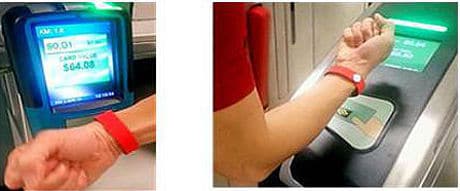
Commuters in Singapore are testing a contactless wristband to pay for public transport services and for goods at retailers equipped with contactless readers.
The trial, involving 200 customers using a Sony SG50 SmartBand, is being conducted by Singapore’s Land Transport Authority (LTA) in partnership with mobile network operator Singtel, Sony, transit card issuer EZ-Link, stored value card and terminal provider NETS and TransitLink and will run until February 2016.
“In addition to public transit, commuters in the trial will be able to use their SG50 SmartBand at a myriad of retail and merchant outlets including food and beverage outlets and libraries,” LTA says.
“The participants will only need to hold up their wrists to the fare card reader on buses and at stations to pay for their journeys.
“To top-up the stored value in the band, participants simply need to place the band on the card reader of a top-up device, just as they would a transit card; they can also opt to register for automatic top-up services.
“For greater mobility, participants can establish a Bluetooth connection with the Singtel mWallet app to check their band’s stored value balance and transactions while on the move. In the future, the wearable may also be topped up through the app.”
“The combination of wearable technology that enables faster, easier and more convenient transit transactions with mobile retail payment services and lifestyle/wellness tracking is an exciting development for commuters,” says LTA CEO Chew Men Leong.
“Insights provided by the trial will help LTA assess the performance of fare transactions using the smart band and gather feedback in assessing the potential use of wearable technology in public transit.”
Next: Visit the NFCW Expo to find new suppliers and solutions
Wearable payments are the future of the payments industry. The future of a cashless society is real. Encryption service providers have to keep pace with developments.